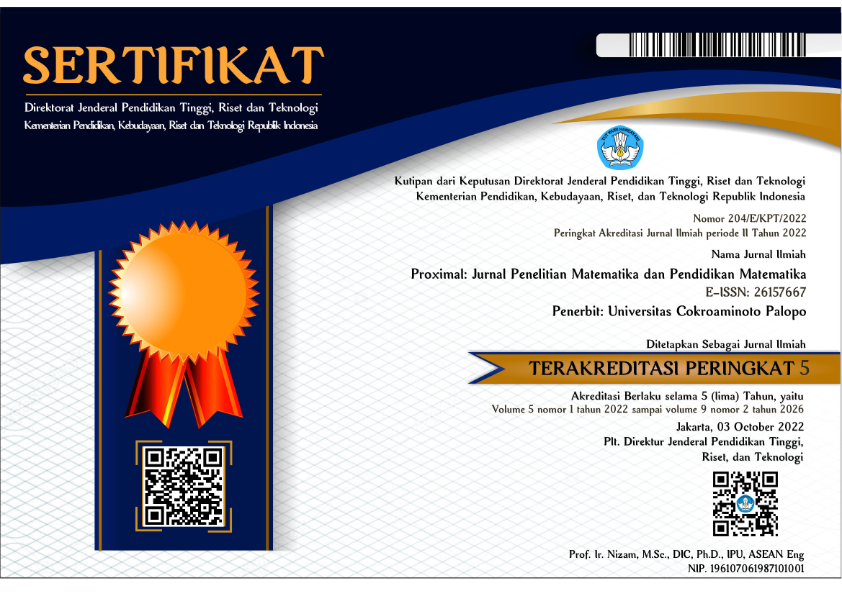Profil Profil Kemampuan Berpikir Kreatif Matematis Pada Pembelajaran Kolaboratif di SMA
DOI:
https://doi.org/10.30605/proximal.v8i3.6237Keywords:
Creative Thinking, Collsborative, LearningAbstract
Penelitian ini bertujuan untuk mengetahui profil kemampuan berpikir kreatif matematis dalam pembelajaran kolaboratif di kalangan siswa sekolah menengah. Metodologi yang digunakan adalah pendekatan kualitatif deskriptif, dengan menggunakan pendekatan pengumpulan data seperti observasi, kuesioner, penilaian, dan wawancara. Partisipan penelitian terdiri dari 36 siswa dari kelas XI 4 SMA Negeri 6 Pandeglang, yang terbagi dalam 5 kelompok kolaboratif. Hasil penelitian menunjukkan bahwa kemampuan berpikir kreatif matematika siswa dikategorikan sedang hingga tinggi, dengan kefasihan dan fleksibilitas yang lebih menonjol dibandingkan orisinalitas dan elaborasi. Elemen kolaboratif dalam pendidikan memfasilitasi pengembangan ide di antara siswa melalui diskusi kelompok dan pertukaran strategi. Hasil penelitian menunjukkan bahwa pembelajaran kolaboratif secara positif meningkatkan kemampuan berpikir kreatif matematika siswa, terutama dalam hal fleksibilitas dan kelancaran.References
Adisaka, K., Margunayasa, I. G., & Gunartha, I. W. (2022). Pengaruh Metode Pembelajaran Kolaboratif Terhadap Minat Dan Hasil Belajar Matematika Siswa Kelas V. Jurnal Ilmiah Pendidikan Citra Bakti. DOI: https://doi.org/10.38048/jipcb.v9i1.670
Afsari, S., Harahap, S. K., & Munthe, L. S. (2021). Systematic Literature Review: Efektivitas Pendekatan Pendidikan Matematika Realistik Pada Pembelajaran Matematika Systematic Literature Review: The Effectiveness Of Realistic Mathematics Education Approach In Mathematics Learning. 1(3), 189–197. DOI: https://doi.org/10.51577/ijipublication.v1i3.117
Erica, D., Haryanto, Rahmawati, M., & Ananta Vidada, I. (2021). Peran Orang Tua Terhadap Pendidikan Anak Usia Dini Dalam Pandangan Islam. Perspektif Pendidikan Dan Keguruan, XII(2). DOI: https://doi.org/10.25299/perspektif.2021.vol12(2).3780
Faroh, A. U., Asikin, M., & Sugiman, S. (2022). Literature Review: Kemampuan Berpikir Kreatif Matematis dengan Pembelajaran Creative Problem Solving. JKPM (Jurnal Kajian Pendidikan Matematika), 7(2), 337. https://doi.org/10.30998/jkpm.v7i2.13071 DOI: https://doi.org/10.30998/jkpm.v7i2.13071
Kadir, I. A., Machmud, T., Usman, K., & Katili, N. (2022). Analisis Kemampuan Berpikir Kreatif Matematis Siswa Pada Materi Segitiga. Jambura Journal of Mathematics Education, 3(2), 128–138. https://doi.org/10.34312/jmathedu.v3i2.16388 DOI: https://doi.org/10.34312/jmathedu.v3i2.16388
Kenmandola, D. (2022). KUALITAS PENDIDIKAN DI INDONESIA Pendidikan Fisika. DOI: https://doi.org/10.31219/osf.io/vwbeu
Mulyadi, E., Yusuf, Y., & Yuliawati, L. (2024). Corresponding Author *. Jurnal Theorems (The Original Reasearch Of Mathematics), 8(2). DOI: https://doi.org/10.31949/th.v8i2.7908
Muthaharah, Y. A., Wandani, K., Prihatnani, E., Keguruan, F., Pendidikan, I., Kristen, U., & Wacana, S. (2018). Analisis Kemampuan Berpikir Kreatif Matematis Siswa Smp Dalam Menyelesaikan Soal Bangun Ruang Sisi Datar. JMP Online, 2(1), 63–75. DOI: https://doi.org/10.22460/jpmi.v1i2.p145-148
Nurlaela, L., Ismayati, E., Sumani, M., Suparji, & Buditjahjanto, I. G. P. A. (2019). strategi belajar berpikir kreatif. In 2019.
Pakaya, I. I., & Ibrahim, D. (2019). Pembelajaran Kolaboratif pada Sekolah Dasar. PEDAGOGIKA. DOI: https://doi.org/10.37411/pedagogika.v10i1.34
Paling, S., Sari, R., Mas Bakar, R., Cory Candra Yhani, P., Mukadar, S., Lidiawati, L. S., Indah, N., & Hilir, A. (2023). Belajar dan Pembelajaran.
Pristiwanti, D., Badariah, B., Hidayat, S., & Dewi, R. S. (2022). Pengertian Pendidikan. Jurnal Pendidikan Dan Konseling, 4. http://repo.iain-
Ranisa Rahma, A., Trisnawati, P., Maria, S., & Studi Pendidikan Guru Sekolah Dasar, P. (2024). Pengembangan Model Pembelajaran Kolaboratif untuk Meningkatkan Kemampuan Problem Solving Siswa dalam Pembelajaran IPS di SD.
Saputra, H., Pd, M., Matematika, D., Iai, P., Salim, A., Lampung, M., Matematika, G., Muhammadiyah, S., & Dahlan, A. (2018). Kemampuan Berpikir Kreatif Matematis.
Sari, R. A., & Untarti, R. (2021). Kemampuan Berpikir Kreatif Matematis dan Resiliensi Matematis. Mandalika Mathematics and Educations Journal, 3(1), 30–39. https://doi.org/10.29303/jm.v3i1.2577 DOI: https://doi.org/10.29303/jm.v3i1.2577
Subagyo, A. (2023). Metode Penelitian Kualitatif Cv. Aksara Global Akademia 2023.
Susanto, D., Jailani, Ms., & Sulthan Thaha Saifuddin Jambi, U. (2023). Teknik Pemeriksaan Keabsahan Data Dalam Penelitian Ilmiah. Jurnal Pendidikan, Sosial & Humaniora. http://ejournal.yayasanpendidikandzurriyatulquran.id/index.php/qosim DOI: https://doi.org/10.61104/jq.v1i1.60
Downloads
Published
Issue
Section
License
Copyright (c) 2025 Hanifa Nur Fidhia Andriana Putri, Abdul Fatah, Maman Fathurrohman3

This work is licensed under a Creative Commons Attribution 4.0 International License.
In submitting the manuscript to the journal, the authors certify that:
- They are authorized by their co-authors to enter into these arrangements.
- The work described has not been formally published before, except in the form of an abstract or as part of a published lecture, review, thesis, or overlay journal.
- That it is not under consideration for publication elsewhere,
- That its publication has been approved by all the author(s) and by the responsible authorities – tacitly or explicitly – of the institutes where the work has been carried out.
- They secure the right to reproduce any material that has already been published or copyrighted elsewhere.
- They agree to the following license and copyright agreement.
License and Copyright Agreement
Authors who publish with this journal agree to the following terms:
- Authors retain copyright and grant the journal right of first publication with the work simultaneously licensed under Creative Commons Attribution License (CC BY 4.0) that allows others to share the work with an acknowledgment of the work's authorship and initial publication in this journal.
- Authors are able to enter into separate, additional contractual arrangements for the non-exclusive distribution of the journal's published version of the work (e.g., post it to an institutional repository or publish it in a book), with an acknowledgment of its initial publication in this journal.
- Authors are permitted and encouraged to post their work online (e.g., in institutional repositories or on their website) prior to and during the submission process, as it can lead to productive exchanges, as well as earlier and greater citation of published work.















